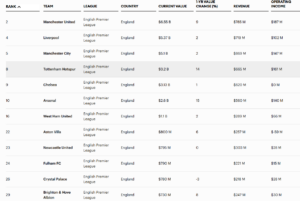
Buying a football club has become one of the most desirable investment opportunities for wealthy individuals, private equity firms, and business partnerships. It’s not only seen as a pathway to financial returns but also as a:
- Prestigious status symbol
- Emotional connection to one of the world’s most beloved sports
- Step toward gaining international stature and philanthropic influence
Whether you’re aiming to acquire a Premier League giant like Manchester United or Liverpool, or a smaller, budget-friendly club in lower tiers, there is something for investors at every level.
Recent High-Profile Examples
- Chelsea FC was sold to the Todd Boehly and Clearlake Capital consortium for £4.25 billion in 2022.
- Newcastle United was purchased by the Saudi Public Investment Fund for £305 million in 2021 — a valuation set to grow after Champions League qualification.
Buying a football club involves complex financial regulations, governance standards, and relationships with fans and stakeholders. This guide covers everything you need to know to succeed in football club ownership.
The Football Club Market Overview
Football clubs have transformed from local institutions of pride to global businesses generating billions of pounds from broadcasting, sponsorships, and merchandising.
Premier League and International Market
- The Premier League generates over £5 billion each season, making it the richest football league globally.
- Premier League clubs hold high valuations due to international broadcasting agreements and global fanbases.
- Investors from America, the Middle East, and Asia dominate the ownership landscape.
Lower Division Clubs
- More affordable price points — Championship, League One, and League Two clubs offer realistic entry points for investors.
- Clubs in lower leagues provide growth opportunities through promotion to higher divisions.
- Lower league clubs are often community assets, allowing opportunities to build goodwill and local support.
European and Global Clubs
- Top European clubs such as Paris Saint-Germain (France), Barcelona (Spain), and Bayern Munich (Germany) are valued at over €1 billion.
- Challenges include Financial Fair Play (FFP) regulations and fan ownership models like Germany’s 50+1 rule.
- Local regulations and market dynamics must be understood when buying a football club.
The Value of Football Clubs

Key Valuation Factors
- League status — Premier League clubs are valued higher than lower league teams.
- Revenue streams — Matchday revenue, sponsorships, broadcasting rights, and merchandising.
- Squad value — Strength of the playing squad and potential for player development.
- Infrastructure — Stadium capacity and training facilities.
- Fan base — Global following and local support.
Premier League Club Valuations (Estimated)
- Manchester United — £4.5 billion
- Liverpool — £4.2 billion
- Manchester City — £4.0 billion
Potential for Undervalued Investments
- Clubs with financial mismanagement but large fanbases offer turnaround opportunities.
- Clubs in major cities with modern stadiums may be mispriced against long-term potential.
- Lower division clubs that can be promoted to higher leagues hold strong upside potential.
Financial Considerations
Initial Investment Requirements
- Premier League clubs — £300 million to over £4 billion
- Championship clubs — £50 million to £300 million
- League One and League Two clubs — Starting at £10 million
Maintenance Costs and Revenue Losses
- Player wages — Largest cost, typically over 60% of total revenue.
- Operational costs — Stadium upkeep, travel, staffing, and training.
- Revenue dependency — Lower division clubs are often loss-making and rely on owner investment.
Steps to Buying a Football Club
Step 1: Conduct Thorough Research
Before pursuing a club purchase, comprehensive research is essential.
Key Elements of Research:
- Identify clubs within your budget and investment goals.
- Evaluate the club’s financial status, including debt and revenue streams.
- Analyze squad value, contract structures, and youth academy potential.
- Assess fan engagement, stadium capacity, and sponsorship deals.
Step 2: Meet the Owners’ and Directors’ Test
The Premier League and the Football Association (FA) impose strict regulations for ownership approval.
Approval Requirements:
- No history of financial mismanagement or bankruptcy.
- Proof of funds and sustainable long-term growth strategy.
- No conflicts of interest with existing football rules.
Step 3: Assess Club Finances
A forensic audit is needed to evaluate the true financial health of the club.
Key Financial Factors:
- Matchday revenue and season ticket sales.
- TV rights and sponsorship agreements.
- Player salary structure and contract length.
- Transfer market strategy and squad value.
Step 4: Secure Funding
Football club acquisitions require significant capital.
Funding Sources:
- Personal equity
- Private investment firms
- Debt financing
- Sponsorship and brand partnerships
Step 5: Prepare for Value Inflation
Strategic investments in player acquisitions, infrastructure, and branding can increase a club’s value.
Growth Tactics:
- Build the squad through targeted player signings.
- Develop a strong youth academy to reduce transfer costs.
- Expand merchandise sales and brand exposure with global tours.
Step 6: Exercise Patience
Takeovers are frequently delayed by complex legal and regulatory issues.
Expected Timeline:
- Regulatory approval — 3 to 12 months
- Contract negotiations with sponsors and stakeholders
- Flexibility and resilience are required to handle potential setbacks
Step 7: Engage with Fans
Long-term success depends on fan loyalty and engagement.
Fan Engagement Strategies:
- Maintain transparency with fans regarding club strategy and vision.
- Support local community initiatives.
- Establish fan advisory boards and open dialogue with supporters.
Financial Risks and Challenges
Short-Term vs Long-Term Profitability
- Short-term losses — Most clubs require owner investment to cover operational costs.
- Long-term potential — Promotion, increased sponsorship, and global branding drive long-term profitability.
Regulatory Challenges
- Financial Fair Play (FFP) rules limit spending based on club revenue.
- Salary caps and squad size limits can restrict operational flexibility.
Management and Operational Issues
- Managerial turnover and player disputes can undermine club performance.
- Fan protests and public relations challenges may require strategic handling.
Takeover as financial salvation?
At the struggling end of the game, a takeover and new owner funding can be seen by the fans as a way out of cash-strapped mediocrity. A quick fix, but there are risks.
“I think the concern is among most of the Premier League clubs and I think all of the Championship clubs is that that they are losing money and the only way to recover those losses is either through asset sales – often players – which also has implications towards achievement and relegation and so on; and owner funding. The owner funding is fine until it is not fine and the owner has a change in personal circumstances as we saw in the case of Chelsea and Everton. Or, they lose interest as we saw in the case of Derby County where the owner put in £200 million, decided he wasn’t getting value for money, and walked away putting the club into administration,“ says Maguire
Yet, you have to follow a rigorous process, to even make it to negotiations, and it is not all about money. Here are seven signposts to success in the football takeover game.
1. Consult before you leap
You would be wise to take on the services of a takeover specialist in the shape of a private consultant like Oakwell to ask for a research paper outlining the best opportunity for takeovers, so says its owner and takeover veteran Andrew Umbers. “That would include broadcasting over the next two cycles, sponsorship, playing squad values, the competence of the squad, finances from Companies House, and then you would make an informal approach to the owner having decided to buying the football club,” he told the Daily Mail.
2. Pass the test
You have to pass the owners’ and directors’ tests to show your fitness before you are allowed to bid. This is set by the governing body, the Football Association. To comply with these rules, you have to prove are not:
- Prohibited by law from being a director;
- Have power or influence over another football club;
- Have a significant interest in another football club;
- Have unspent criminal convictions involving dishonesty, corruption, perverting the course of justice, or a serious breach of the Companies Act;
- Have been convicted under FA Rules of betting or bribery offences;
- Bankrupt or are filing for bankruptcy;
- Banned by a sports governing body or a professional body;
- Bou are required to notify personal information under Pt 2 of the Sexual Offences Act 2003;
- Been an officer of two or more clubs that have entered into an insolvency event, or, have been an officer of one club that has had two separate insolvency events, within the last five years;
- Been an officer of a club that has been expelled from the Premier League, Football League, Conference, Isthmian, Northern Premier or Southern Football Leagues within the last five years.
3. Check the revenue
Look at the books, from sponsorship to television money to operational costs. “If you look at that, the cashflow before player trading, which can be negative or positive, you can actually drive at the underlying profitability of what a club is. In the Premier League, because of the very high broadcasting rights in that league compared to the EFL, it’s easy to apply what you think is a realistic multiple – eight to 12 times – for buying a football club,” advises Umbers.
4. Gather your money
New rules make this slightly more complicated these days. It is not so easy to buy a club with a leveraged deal. New rules say only two-thirds of the price of a Premier League club can be raised with debts. “That commitment only lasts for 12 months, so, therefore, you could still be debt-financed after being acquired,” says Maguire. It is better to enlist solid, credible, investors.
5. Be prepared for inflation
The value of Premier League clubs goes up every year. It is probably best to buy in, rather than wait. In 2003 when Roman Abramovich bought Chelsea for around £120 million. When he sold it – arguably, in a fire sale after being sanctioned – the club fetched £4.25 billion.
6. Patience
You have to be incredibly patient to buying a football club. Aside from the compliance lawyers and money questions you have to be prepared to ride the twists and turns that appear to punctuate takeover deals these days. “ Takeovers take time. A standard takeover would normally take nine months. It is a bit like having a baby really,” says Ben Jacobs, a football journalist at the heart of the Manchester United takeover story.
7. Win over the fans
A very important part of your deal, often overlooked by many big-money buyers who don’t understand the game and supporters’ passions. At Manchester United, the Glazers found out the hard way that fan anger can be very damaging and can tarnish the image of the asset. You would be wise to bring in key figures – former players, influential people, or stalwarts at the club – to earn confidence among the fans and build bridges for the future… At the end of the day, the fans have customer loyalty that most businesses would die for.
Conclusion
Buying a football club requires a blend of financial insight, operational expertise, and strategic vision. To succeed, you must:
- Conduct thorough research and due diligence
- Secure funding from diversified sources
- Build long-term value through strategic player investments and fan engagement
- Be prepared for operational challenges and regulatory hurdles
By understanding the market and financial dynamics, you can transform a football club into a profitable and successful long-term investment.
Want more insights on finance, current events, business, news and more? Sign up for the Matt Haycox newsletter for fresh updates every week.






